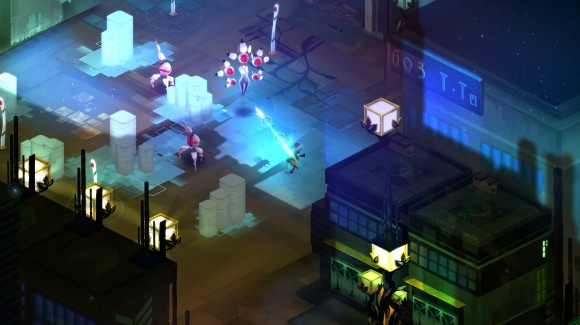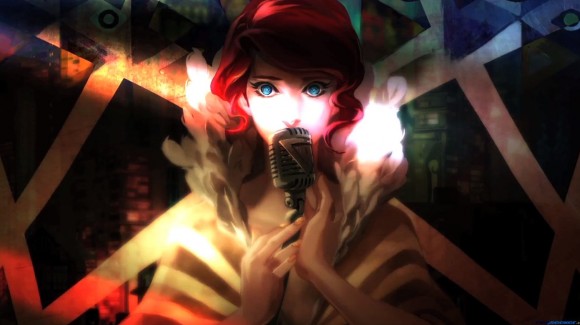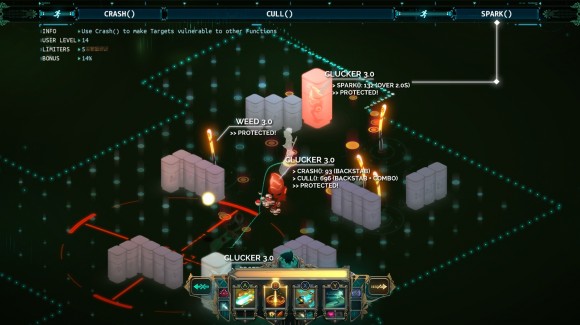It’s no secret that I am a huge fan of Super Giant Game’s Bastion, a game that did not push the boundaries of design in gameplay, but showed that art direction, plot, and musical composition can really elevate a game with solid and simple gameplay into something that is more than the sum of its parts. Super Giant Game’s second offering, Transistor follows the same rule of design. Some of the same themes are there as well, and the narrator, perhaps the most popular feature in Bastion, is also back, in a way. Bastion also featured a deceptively deep system that allowed you to choose the loadouts to suit your play style. Transistor’s system builds on that, giving it even more depth, and making the game a bit more interesting than just “Cyberpunk Bastion”.
Transistor puts you in the shoes of Red, a woman that is having a very bad night. When the game opens it wastes no time dropping you right into the action. Right off the bat players will find themselves among torn gowns, and a dead body impaled with a sword. The first action you will take in the game will be to pull that sword, the titular Transistor, from the dead body. You are told very little upfront, rather the story is conveyed by a mix of the dialogue in the game, snippets you gather from terminals, and through reading the profiles of the Transistor’s abilities. Red has had her voice taken away from her, while the person on the floor has become trapped inside the sword. All of the dialogue in the game passes through the sword, as it communicates its feelings, fears, thoughts, and occasionally background information. Red and the Transistor do communicate, mostly by terminals where Red can type her thoughts out. It makes for a compelling way to tell the story, which also combines perfectly with the gameplay.
Transistor uses a level system familiar to any RPG fan. As you gain experience you will level up, leveling up can have number of effects on Red including granting you new abilities, giving you more capacity for said abilities, and augmenting the existing skills you’ve acquired. Completing certain tasks, like beating a boss, leveling up, and completing some of the challenges stages will unlock access to the different abilities, which you can equip in a passive, active or secondary slot. These abilities are represented by people, and using them in different ways unlocks different parts of their story. Reading these snippets goes a long way in fleshing out the game world and the story. It is also a great way to make players experiment with different ways of playing the game, and find new combinations from new abilities, which is sometimes hard to do when players discover something that works well. There are a lot of overpowered combinations in the game, for example, combining the charm ability with any other will not only deal damage, but it will also make enemies fight for you. To further support this, if you take too many hits, the transistor will overload abilities, which won’t be restored for some time, forcing you to swap them out for other abilities and try out different combinations.
The combat itself is pretty standard for action RPGs. Red can use the transistor to stop the action and plan her moves in advance with an ability called turn(). Once you plan your actions and execute them, you come back to the regular flow of the game, but the sword will need to charge again, at which time you are vulnerable. The use of turn() can be crucial, especially with some of the game’s most complicated encounters, but the game never really throws anything too overwhelming at you. Players will certainly find some challenging moments, but nothing that should not be possible to clear with some understanding of the game mechanics.
Transistor offers a linear progression through the city of Cloudbank, and it consists of a series of the battles broken down with some very light exploration, in which you will get the material to figure out the parts of the story that have been left unsaid. Exploring what little you get to see of Couldbank is a treat, thanks to the game’s beautiful art style. As in Bastion, the style is still somewhat cartoonish, but this time it recalls an aesthetic closer to animation that is aimed at a more mature audience, unlike Bastion which seemed to have an element of child-like wonder to it. Transistor is still colorful, but the style is a Deco cyberpunk hybrid rather than the colorful fantasy colors of its predecessor. Music is also integral to the game, so it is good that the soundtrack is fantastic. Boss battles seem to have their own themes, and the detail of Red humming the songs at some points of the game (for example when going into turn()) really adds to the experience. The music is cleverly set up to accompany the story beats, and it works so well, that during an odd bug that left my game without sound it really felt like major piece of the game was missing.
The sound issue was far from the only bug that Transistor had. Ever since sitting down to review it, I have experienced copious technical problems with the game, experiencing issues that range from stutters, to odd glitches, to complete game crashes. The developer has been pushing out patches to fix these mistakes regularly since the game launched, but even then it has been a challenge to play the game, and some of the patches seem to cause more problems as they fix old ones. It is still a hassle to have to experiment with windowed mode, changing Steam to offline mode, disabling Steam community, and jumping through hoops to get to play the game. This is strange as Supergiant’s other entries always seem to have worked perfectly.
Transistor does not bring anything particularly new or innovative to the table, rather it uses some seldom seen concepts well, combines them with a good story, excellent visuals, and a fantastic soundtrack which are put together extremely well to deliver an experience that is more than the sum of its individual parts. The story and gameplay are straight-forward, there will be few surprises here for those who have been paying attention, but the gameplay and story are very well integrated. The interplay between the abilities and the stories behind the people that were represented by each ability are well done and truly encouraged me to experiment with different combinations, uncovering some truly devastating ones in the process. If you are a fan of action RPGs at all I highly recommend this game, or even if you are fan of games for their narrative and art direction, however, if you dislike action RPGs at all, then Transistor is not the game that will change your mind. The game is a bit short, even with the new game + mode that is unlocked upon completion, but regardless of that I would say it is worth the $20 price tag were it not for the bugs. While I tried the Steam version and I can’t speak to the situation for the PS4 release, I would recommend waiting a few weeks before dropping the cash to buy it. Regardless of when you choose to get it, the game is very near perfect, and an entry on par with Supergiant’s beloved first game. I look forward to see what else they will come up with in the future.









